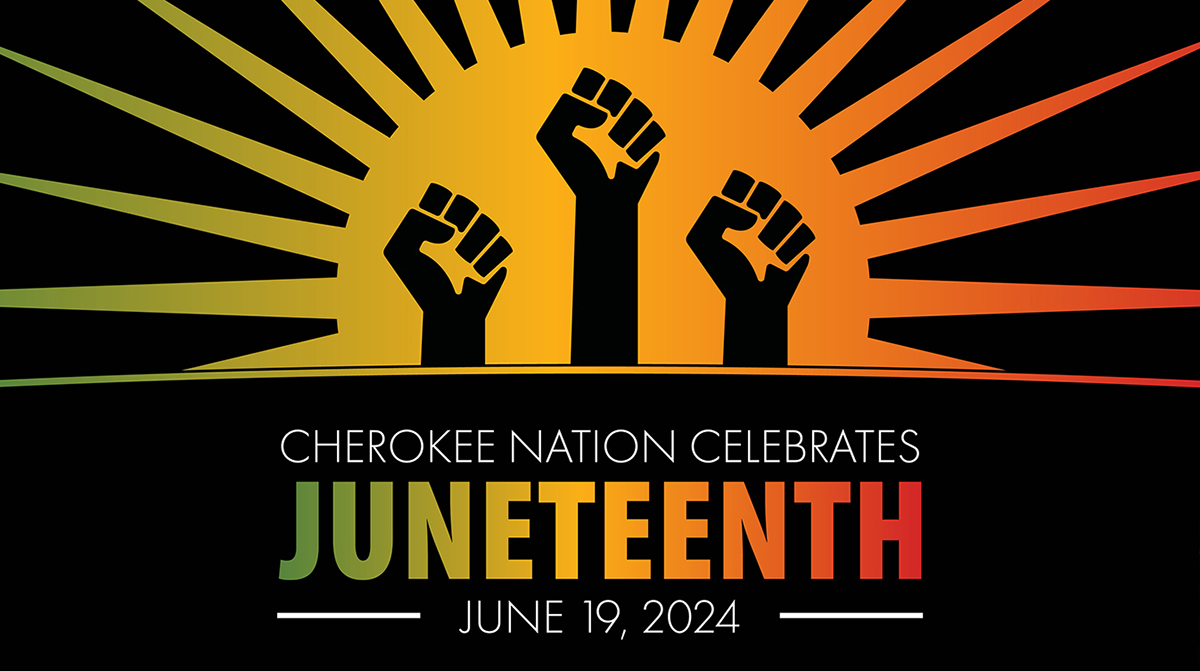
- Details
- By Chuck Hoskin Jr
Guest Opinion. Juneteenth marks a joyous moment in American history — the final emancipation of enslaved African Americans. This day, recognized every year on June 19, is a celebration of freedom and mark on our national journey toward equality and reconciliation with our difficult past. For the Cherokee Nation, Juneteenth is especially profound as we celebrate an important moment for the United States and also reflect on our own history.
The Cherokee Nation, like much of the United States, has a complex and troubled history with slavery. In the 19th century, the Cherokee Nation, along with several other Native tribes, adopted the practice of enslaving others for their labor. We must acknowledge and learn from this dark chapter in our history. Emancipation came to the Cherokee Nation with the Treaty of 1866, which granted freedom to all enslaved people within our tribe and made them and their descendants full citizens for all time.
Today, equality is the order of the day within the Cherokee Nation. We are proud to count more than 15,000 Cherokee citizens of Freedmen descent among our robust population. These citizens of our tribe have all the rights, benefits and responsibilities that come with Cherokee Nation citizenship. We continue to lead the way through our commitment to justice and equality.
Juneteenth is a mark of progress but also a reminder of the work still ahead for greater equality and justice. Deputy Chief Bryan Warner and I, along with the Council of the Cherokee Nation, are committed to that work. Our commitment is reflected in the Cherokee Nation Executive Order on Equality, which seeks to ensure that all Cherokee citizens, regardless of descent, are treated with the dignity and respect they deserve.

Recently, a task force of community leaders studied whether Cherokee citizens of Freedmen descent are provided equal access to tribal programs and services. The report is revealing and will inform our efforts, going forward. There are areas where we are meeting the mark when it comes to fulfilling the obligations of citizenship available to Freedmen, and there are areas where we are falling short.
On the issue of Freedmen and equality, we believe firmly that we cannot hope to heal if we close our eyes to the history of slavery. We cannot make progress if we are unwilling to examine whether our efforts at healing today are adequate. This task force report gives us some important answers, and some guidance, and challenges us to ask even more questions.
Additionally, we are calling on Congress to update the Federal Major Crimes Act, so that our Freedmen descendant citizens have the same right to due process as other Cherokees. Current federal law creates a separate and unequal system of justice for Cherokee citizens of Freedmen descent. Cherokee Nation has lived up to its treaty promise of equal rights to all of our citizens, and we are calling on the United States to do the same.
I hope we can all put the passion we feel about Juneteenth into civic action. As the largest tribe in America, we work tirelessly to ensure our policies reflect our values and that every citizen has the opportunity to thrive.
We continue to honor the history of Cherokee citizens of Freedmen descent through a world-class traveling museum exhibit currently on display at the U.S. Marshals Museum in Fort Smith and by the leadership of the Cherokee Freedmen History Project. Those stories and contributions are integral to our shared history.
Together, by acknowledging our past and taking bold steps toward greater justice, Cherokee Nation honors the true spirit of Juneteenth — the power of reconciliation and the promise of a better future for all.
Chuck Hoskin, Jr. is the principal chief of the Cherokee Nation.
More Stories Like This
Tribes Seek Better Data, Real Accountability in MMIP Cases Ahead of Tribal ConsultationWhat Would Dr. King Say About ICE?
In Unity and Commitment
Protecting Our People through Human Trafficking Awareness
It is Time for Animal Behavior to Become Its Own Discipline
Help us defend tribal sovereignty.
At Native News Online, our mission is rooted in telling the stories that strengthen sovereignty and uplift Indigenous voices — not just at year’s end, but every single day.
Because of your generosity last year, we were able to keep our reporters on the ground in tribal communities, at national gatherings and in the halls of Congress — covering the issues that matter most to Indian Country: sovereignty, culture, education, health and economic opportunity.
That support sustained us through a tough year in 2025. Now, as we look to the year ahead, we need your help right now to ensure warrior journalism remains strong — reporting that defends tribal sovereignty, amplifies Native truth, and holds power accountable.
 The stakes couldn't be higher. Your support keeps Native voices heard, Native stories told and Native sovereignty defended.
The stakes couldn't be higher. Your support keeps Native voices heard, Native stories told and Native sovereignty defended.
Stand with Warrior Journalism today.
Levi Rickert (Potawatomi), Editor & Publisher

